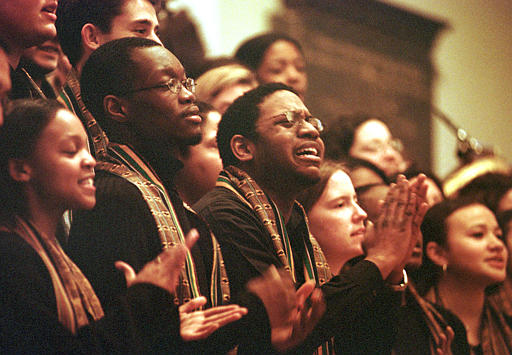Made by History

Black History Month service held at The Memorial Church in Cambridge, Mass.
February 16, 2016
With each passing year, it seems that America can’t get enough of the holidays. From the nationally recognized stuff-your-face Thanksgiving holiday, to the lesser known, yet comedically telling, National Burger day, we obviously love to celebrate anything, and everything.
The month of February is not an exception either. February marks the remembrance of Black History: a holiday that grew from a simple week of acknowledgment, to a month-long period of celebration.
This transition was not a quick one either. Black History week was first established in 1915 as a week to celebrate the accomplishments and key roles of African Americans in U.S. history. Prompted by Carter G. Woodson and the Association for the Study of Negro Life and History, communities nationwide began establishing recognition of the week in the decades to come. It wasn’t until after the influential works of the Civil Rights Movement in the 1960s, however, that a growing sense of black identity quickly emerged across America, thus prompting President Gerald R. Ford to officially recognize Black History Month in 1976.
Ever since its establishment exactly forty years ago, Black History Month continues to be celebrated in schools, communities, and states nationwide.
“It reminds me that I need to find opportunities to engage my students in meaningful discussions about race,” says AVHS civics teacher Evan Brewer. “The goal is to be inclusive so we aren’t depriving people of their humanity based on extraneous factors.”
Every year brings a new theme to Black History Month; 2016 marks the theme of Hallowed Grounds: Sites of African American Memories. This theme aims to remember all of the prominent places African Americans have made an impact throughout history. From the depths of the Underground Railroad to the hallways of Little Rock Central High School, the footprints of African American history have been deeply embedded throughout the United States.
Unfortunately, the extravagance of themes can, in some ways, undervalue the entirety of Black History. Although many of us know about Harriet Tubman and the Little Rock Nine, how many of us know about Bayard Rustin, a man who not only organized the march on Washington, but also advised Dr. Martin Luther King himself on civil disobedience tactics? Or how about Gloria Richardson, a civil rights activists who worked to desegregate Cambridge, Maryland? By being blinded by the most prominent aspects of the past, we seem to silence the full nature of Black History.
As AVHS teacher Gerald Hayes said, “I get concerned that we are only talking about MLK, Rosa Parks, Booker Washington, Jackie Robinson, and are forgetting the impact that many had under extreme duress. I think the danger is that if people feel they have knowledge of five African Americans, they understand black history.”
Hayes, father of three adopted African American children, is convinced that we must all be consciously aware of not only pivotal points in history, but also all of the struggle African Americans had to overcome to reach a point of equality today.
“I hope that students today would appreciate that students their age once risked their lives to go to school, and recognize that we have people (of all races) who do not see the same value. The apathy that we see for school by some, I think, would be miraculous to witness by students of the 50s and 60s.”
He shares these thoughts with his children every time an opportunity arises. “We have open discussions,” he said, “highlighting the struggles, trials and tribulations that ordinary people had just to get an education, get a job, or even eat at a restaurant.” It is these struggles that Hayes believes can act as a catalyst to motivate today’s generation.
We are not left with just the task of increasing our awareness, however. Many argue that we must also expand Black History Month to more than just a 29-day period of remembrance. Because, in all honesty, history is a shared experience by all.
Even renowned actor Morgan Freeman asserted his take on the celebrated month in a December 2005 interview with Mike Wallace of CBS’ 60 Minutes, stating, “I don’t want a Black History Month. Black history is American history.”
“I think the fact that we have to designate a month to celebrate a particular social group indicates that we still have a ways to go,” says Hayes. “We have to get to a point where it is so ingrained in us that we no longer distinguish a group, we just recognize it as our collective history.”
In any regard, it is important to never forget the history of every oppressed social group in America. Just as Black History Month aims to remember all of African American history, Women’s History Month–celebrated in March–aims to do the same for women. We must never forget all of those who have struggled in the past, whether by race, gender, or sexual identity. Because, American history is everyone’s history.


